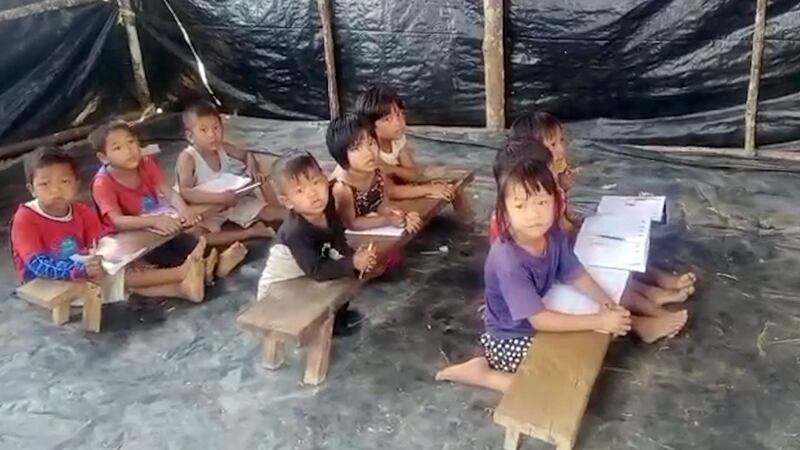More than two years after a coup d’etat, anti-junta “self-help” community schools are thriving in western Myanmar’s Chin state, but teachers and parents say studies are hindered by the constant threat of indiscriminate airstrikes.
Since the February 2021 takeover, students across the country have dropped out of schools run by the military regime, while teachers have been at the forefront of the Civil Disobedience Movement, or CDM, of civil servants leaving their jobs to protest the coup.
In the education vacuum that followed, communities around Myanmar cooperated with local People’s Defense Force paramilitaries to establish their own “self-help” schools where students and teachers could continue their classes free from junta influence.
Self-help schools in Chin state have enjoyed high rates of enrollment and, while the exact number of facilities is still being finalized, around 90% of those planned are operational, according to the local board of education.
But residents told RFA Burmese that airstrikes are increasingly common in the state amid a military offensive since the start of the year, impacting childrens’ studies.
“We are always anxious as the jet fighters often fly over us,” said the headmaster of one Chin self-help school, who spoke on condition of anonymity citing security concerns. “The planes always come when you least expect them."
Constant fear
A self-help schoolteacher, who also declined to be named, said that the locations of the schools in Chin state cannot be publicly revealed because teachers and students live in constant fear of junta airstrikes, ground offensives and other harassment.
“Junta troops intercept and confiscate supplies and teaching materials that aid organizations and benefactors donate to us,” he said. “That's why even opening a school has to be done quietly."
The junta has tried to administrate education in Chin, but with little success.

According to the Chin Human Rights Organization, only a handful of the 14 schools it operates in the state are functioning and mostly in cities it controls. Residents say that those that have opened suffer from teacher shortages amid an exodus to the CDM.
Despite the threat of military attack, self-help schools have fared far better in the state since the coup.
According to education officials, more than 50,000 students are currently enrolled in self-help schools at levels from elementary to high school throughout Chin State. They said that in Mindat township, at least 180 self-help schools are operating – one for nearly every village in the area.
Studies amid conflict
Yaw Mam, a spokesman for the Mindat People’s administration said there are challenges associated with running a self-help school, including the need to split students into smaller groups in separate locations to avoid crowds that might attract attention from the military.
“Students have to study in farms, houses, monasteries and churches,” he said. “We have to split them into smaller groups in separate locations throughout the whole village."
Attacks on villages have led to injuries and even deaths at self-help schools.
On April 27, the junta dropped bombs on the Chin village of Tlanglo as a self-help school was preparing to open, killing a teacher named Ni Dim.
The Chin Human Rights Organization says that nearly 30 schools and buildings in school compounds in Chin state have been damaged by military airstrikes since the coup.
Chin social commentator Salai Dokhar said he believes that the junta has intentionally attacked schools and hospitals controlled by the PDF in Chin state in a bid to shake public confidence in the armed resistance.
“If you look at Chin state, public services provided by the revolutionary forces cover far wider areas than the military and the people are more dependent on these services,” he said. “That’s why I think the junta attacked hospitals and schools with the intention to damage the revolution."
Attempts by RFA to contact the junta’s Chin state spokesman Thant Zin regarding military attacks on schools went unanswered Thursday.
According to a list compiled by RFA, at least 35 civilians have been killed by junta airstrikes in Chin since the coup.
Translated by Myo Min Aung. Edited by Joshua Lipes and Malcolm Foster.
